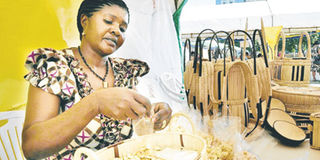Commodity exchange to raise agriculture share to economy

A woman packs cashew nuts. The crop will be traded on the Commodity Exchange Market. PHOTO|FILE
What you need to know:
Agriculture, the current biggest contributor, may accelerate its share as the exchange will provide reliable market and mechanism for price discovery for the produce to be trading
Dar es Salaam. Contribution of agriculture to Tanzania’s economy is seen rising soon when the Commodity Exchange market starts.
Agriculture, the current biggest contributor, may accelerate its share as the exchange will provide reliable market and mechanism for price discovery for the produce to be trading.
The Capital Markets and Securities Authority (CMSA) is finalizing preparations for the exchange which will facilitate trading of various commodities mainly agriculture in an orderly and organized fashion with clear rules.
That will make the agriculture sector a business like others and attract investment.
“So far, we do not have specific projection figures as to how much agriculture contributions to GDP will increase, but having a reliable market and the fact that warehouse receipts will enable owners to use them as collateral, are factors which will accelerate output,” says Mr Charles Shirima, CMSA principal public relations officer.
“We are now in the process to appoint a consultant who will conduct a study that, among other things, will assess warehouse facilities and identify those to be accredited as the exchange’s site delivery. All in all, transaction cost will reduce and prices will increase in a transparent manner. The share of agriculture to GDP will definitely rise,” he adds.
Agriculture accounts for about 28 per cent of the GDP and employs about 70 per cent of the Tanzanian workforce.
The exchange demands formation of a trading company and Tanzania Mercantile Exchange Public Limited Company has already been incorporated.
Local private sector institutions including cooperatives and farmers’ organizations will hold 51 per cent stake in the Tanzania Mercantile Exchange Public Limited Company established as a vehicle for the Commodity Exchange Market set to commence this year, chief secretary Ombeni Sefue, was recently quoted as saying by the media.
The regulator will engage a consultant in September for the preparation of the business plan, CMSA says.
From the experience gained from India, Ethiopia, China, South Africa and Malawi, it has been observed that commodities like cashew nuts, sunflower, sesame, coffee, maize, tobacco, tea, rice, sisal, oil seeds, pigeon peas, wheat, sorghum, timber, cardamom and others would well fit in the planned commodity exchange.
However, CMSA says Tanzania will start with four selected commodities which are already operational in the current warehouse receipt system.
They include cashew nuts, sesame, sunflower and paddy/rice.
“Other products can be increased as the exchange gains confidence and positive results and as the warehouse receipt system coverage widens,” says Ms Nasama Masinda, CMSA chief executive officer.
She says the country’s “Kilimo Kwanza” initiative will not realise its objectives without a viable and properly functioning commodity exchange market.
Dr Bharat Kulkarni, director of the India-based Stalwart Management Consultancy, told participants including government officials in the recent training workshop that the commodity exchange market would positively contribute to the country’s exports and economy at large.
He mentioned an example of MCX in India and ECX in Ethiopia which, in just three years, grew their daily turnover to $2.5 billion and $10 million respectively.
“The market has a big role in the economy and its performance can be measured through exports and growth of the minimum price of several products,” he says.
President Jakaya Kikwete has already signed into law the Commodity Exchange Bill passed by Parliament recently.
Regulations are being prepared and expectations are that the exchange starts before the end of this year.




